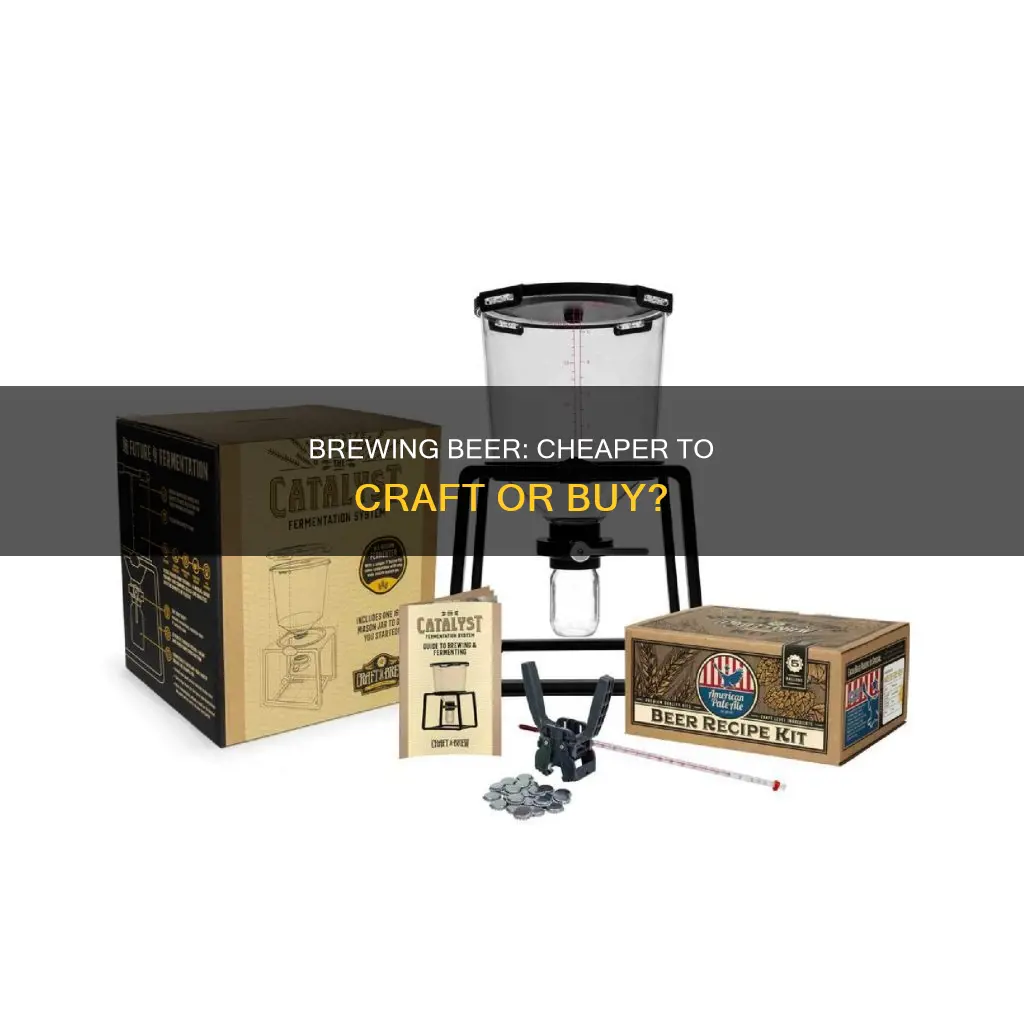
Homebrewing is a popular hobby for many, but is it a cost-effective way to enjoy beer? The answer depends on a variety of factors, including equipment, ingredients, time, and labour.
The upfront cost of homebrewing equipment can be a barrier, with basic kits starting at around $200. However, the quality of the equipment is important and investing in better tools can lead to better beer. For those looking to save money, buying second-hand equipment is an option.
Ingredient costs can also vary, with recipe kits ranging from $35 to $80. Buying ingredients in bulk or online can help reduce costs. The type of brewing method used, such as extract, partial mash, or all-grain, will also impact ingredient costs.
Time is another significant factor, as homebrewing can be a time-consuming process. It is estimated that brewing a batch can take a minimum of 8-9 hours spread across a 5-week waiting period. This includes brewing the wort, transferring, bottling, and cleaning/sanitizing.
When considering the cost of labour, homebrewing may not be the cheapest option. If a monetary value is placed on the time spent brewing, the cost per beer can increase significantly. However, many homebrewers argue that the enjoyment and satisfaction of creating their own beer outweigh any financial savings.
Overall, homebrewing can be cheaper than buying beer, especially when compared to craft beer prices. However, it may take a significant number of batches to reach a break-even point, depending on the equipment and ingredient costs. For those with the passion and dedication, homebrewing can be a rewarding and cost-effective hobby.
What You'll Learn

The cost of ingredients for home-brewing
Home-brewers can either buy pre-arranged ingredient kits, which cost around $35-40, or buy their own ingredients separately. The cost of ingredients for a basic 5-gallon batch of beer can be as low as $10, not including fuel costs, or as high as $60 for more complex recipes.
For example, a basic brown ale recipe may include 1 lb of specialty grain ($1.50), 8 lb of 2-row grain ($4.80), 2 oz of cascade hops ($1.60), a yeast starter ($0.25), and priming sugar ($0.85 for CO2 and electricity), totalling $9.00 for 50 beers or $0.18 per beer.
On the other hand, a 5-gallon batch of a hoppier, stronger beer may cost upwards of $50-60 for ingredients alone.
Home-brewers can save money on ingredients by buying in bulk, grinding grains at home, and reusing yeast.
Beer Buying in Pinellas County: Legal Age and Time Limits
You may want to see also

The cost of equipment for home-brewing
For example, an extract brewer with basic equipment who bottles their beer may only spend around $200 on a home brewing kit, kettle, and other small items. On the other hand, an all-grain brewer with advanced equipment, including kegs, mash tuns, and wort chillers, could spend upwards of $1,500.
The cost of ingredients per batch also varies depending on the type of beer being brewed and where the ingredients are sourced. Basic extract kits can be purchased for as little as $25, while more complex recipes or specialty ingredients can cost $50 or more.
In addition to equipment and ingredient costs, home brewers may also need to invest in fermentation and brite tanks, kegs and keg washers, and bottling or canning equipment. These items can range in price from a few hundred to several thousand dollars, depending on the size and specifications.
While it is possible to brew beer at a lower cost than buying it, particularly for those with expensive taste in craft beer, the upfront costs of equipment and ingredients can be significant. However, for many home brewers, the enjoyment and satisfaction of crafting their own beer outweigh the financial savings.
Beer and First Officers: Who Pays the Tab?
You may want to see also

The time and effort required for home-brewing
Homebrewing is a time-consuming process that requires several hours of hands-on work, as well as weeks or months of waiting for the beer to ferment and condition. The entire process, from brewing to drinking, can take anywhere from a month to several months. However, the amount of time spent actively working on the beer is relatively low compared to the idle time required for fermentation and conditioning.
The time required for homebrewing depends on various factors, including the type of beer being brewed, the brewing method used, and the level of detail desired by the brewer. For example, all-grain brewing can take about six hours, while brewing with malt extract or doing a partial mash can reduce the time by about an hour. Additionally, some beer styles, such as ales, are ready to drink sooner than others, such as lagers, which require a longer cold lagering phase.
Before beginning the brewing process, it is important to spend time researching and acquiring the necessary equipment and ingredients. This includes sanitizing all equipment to ensure a successful brew. The actual brewing process involves several steps, such as steeping grains, boiling the wort, cooling the wort, adding yeast, and bottling the beer. Each of these steps can take varying amounts of time, depending on the specific recipe and equipment used.
While homebrewing can be a rewarding hobby, it is important to consider the time commitment required. The process is not simply about the hands-on time but also the idle time required for fermentation and conditioning. For those who are just starting out, it is recommended to start with a cheaper and beginner-friendly kit to get a sense of the process and the time commitment involved.
Buying Beer Early: What Time Is Too Early?
You may want to see also

The cost of buying beer at a store
When purchasing beer at a store, it is also important to consider the quantity and packaging. For instance, Walmart offers a 12-pack of Heineken for $15.98, while a 6-pack costs $9.27. Similarly, a 12-pack of Corona Extra costs $15.98, but an 18-pack is priced at $21.98. Buying in bulk often results in savings per unit, but this is not always the case, and it is essential to compare prices and be mindful of one's budget when stocking up on beer.
In addition to the base cost of the beer, there may be additional costs associated with purchasing beer at a store. These can include sales tax, deposit fees for bottles or cans, and fuel surcharges for deliveries. Environmental surcharges may also be applied to cover the costs of recycling or other sustainability initiatives. These additional fees can add up, especially when purchasing large quantities of beer or when ordering online, where delivery fees may also apply.
While buying beer at a store offers convenience, it is worth noting that the cost of store-bought beer has been rising due to inflation and the cost of living crisis. This has made it more expensive to enjoy a simple pleasure like a cold beer. As a result, some individuals may explore alternative options, such as brewing their own beer at home, to manage their expenses. However, the initial investment in equipment and ingredients for home brewing can be significant, and the overall savings may depend on various factors, including the type of beer brewed and the frequency of brewing.
Spotted Cow Beer: Where and How to Buy It
You may want to see also

The cost of buying beer at a bar
In the UK, a Brewdog Punk IPA (330 ml/11.15 fl oz) costs $2.29 (£1.80) at Sainsburys. A similar IPA beer making kit from Amazon costs around $40 and produces roughly a 1 US gallon yield of beer (3.78 liters/ 0.83 Imperial gallons). This works out to a unit price of $3.79 per beer, which is more expensive than buying the Punk IPA from the supermarket. However, if you increase the yield to 5 gallons, the cost per beer decreases to $2.07, resulting in a small saving.
In Canada, a six-pack of decent beer can cost upwards of $13-16. Homebrewing can save money, but the initial investment in equipment can be costly, and it also requires a significant time commitment. Overall, brewing your own beer can be cheaper than buying at a bar, but it depends on various factors such as the type of beer, equipment costs, and the time and skill level of the brewer.
Underage Drinking: Buying Beer for Friends, Risky Business?
You may want to see also
Frequently asked questions
Brewing your own beer can be cheaper than buying it, but it depends on a lot of factors, including the quality of ingredients, the amount you drink, and your brewing methods. Brewing equipment can be expensive, and the time and effort it takes to home brew should also be considered.
A basic brewing kit for beginners costs around $200. A beer recipe kit can range from $35 to $80. Each batch makes about 50 beers of 12 ounces each, so the cost per beer decreases with each batch.
Brewing your own beer is time-consuming and can take a minimum of 8-9 hours spread across a 5-week waiting period. Most of the time is spent on the first brew day, with the rest spent on transferring, bottling, and cleaning/sanitizing.
Brewing your own beer can be a fun and rewarding hobby. It allows you to experiment with different ingredients and create unique beers that you can share with others. It can also be a way to save money on beer, especially if you drink a lot or prefer craft beer.







